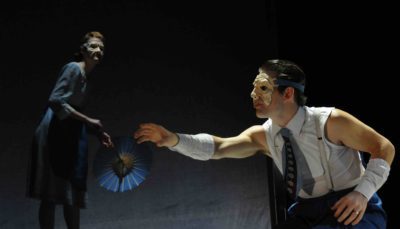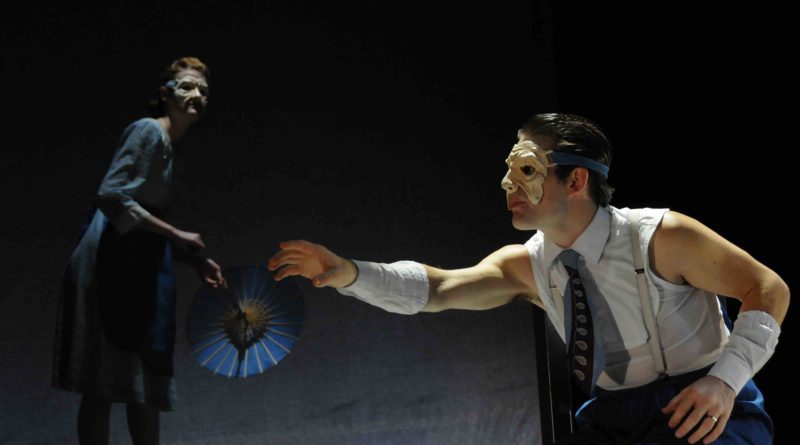INTERVIEW: Theater Mitu investigates ‘Death of a Salesman’ at BAM

The Arthur Miller classic Death of a Salesman is gearing up for a revival at the Brooklyn Academy of Music’s Fishman Space. The production is thanks to the cutting-edge company Theater Mitu and director Rubèn Polendo. Performances run July 14-23.
In the family drama, the Loman family is dissected with a magnifying glass. They may seem infallible and loving at first, but those sentiments soon enough change. Willy Loman, the paterfamilias, proves to be a broken, imperfect man, someone who continues to impact the lives of his wife and sons.
In the new production, Denis Butkus plays the role of Happy, one of Willy’s sons. It’s a pivotal character in the play, but it appears Butkus is up for the challenge. Recently Hollywood Soapbox exchanged emails with the actor about the play. Questions and answers have been slightly edited for style.
As an actor, how do you approach playing Happy? What type of person do you believe him to be?
Happy is at once eager to please his father and lionize his brother, while constantly disappointing his mother. Above everything else, he wants the family to stay together. I also think he represents the duality of life in trying to get ahead and survive in New York City. We are all wrestling with something like competitiveness [versus] compassion in this town, even today. He believes the dream and is sticking around to see it out, no matter what the cost.
For me, he becomes a punching bag of all the dashed hopes, dreams and expectations of his family. But he’s trapped between this object — the punching bag — and his humanity. He resents this by shaming his father and chasing after women. At the end of this very long day though, he is the one who survives. He‘s ‘not licked that easily’ and will carry the torch his father lit, even if that means he will never see his father or his older brother again.
During rehearsal, did you have to work closely with the actor playing Willy Loman?
I’ve worked closely with Justin for the last six years. He and I have been through a lot together with Theater Mitu: from conducting performance research in some of the most iconic cities in the world to performing at BAM. This marks our fourth production, and it is very much an extension of all the work we do together. I love the guy — he’s one of the good ones. He’s tirelessly loyal, wickedly smart and one of the most audaciously physical performers I’ve ever met. Come see the show, and you will see what I mean. To match all of this is his heart — he brings that to his Willy, his big beating heart, and it breaks mine every night.
What makes Arthur Miller’s dialogue so interesting from an actor’s perspective?
The contradictions. Miller captures, quite uniquely, the human ability to be two things at once. It is possible for Happy to be both a horrible womanizer who only thinks of himself and someone who is trying to keep his family together, brings his mother flowers, all the while reinforcing the lies that have been embedded in the Loman foundation. It’s in this mess of emotion and the impermanence of human belief that I find the true character of a specific time in Miller’s America.
This play is a snapshot that tells a thousand stories of today’s America. It is by looking back at it that I see many of the same social themes we are dealing with today: immigration, class warfare, patriarchy, civil rights, the devaluation of the American dream coupled with our inability as a culture to redefine the tenets of success away from how much money you make or how famous or well known you are. It’s heartbreaking to see how far we have come in the halls of progress only to be dead-ended in a room with no windows or doors with which to escape our current American dystopia. Miller leads us into the maze and posits that our only way out is death. That’s a cold reality that we all must face, which is especially relevant today when a new health care bill could be passed by Congress, which threatens to punish the working poor for being sick and could secure the loss of insurance for millions of hard-working Americans.
What’s it like to work with Theater Mitu? Is the company supportive?
Theater Mitu is a group of amazing artists, and all of them have simultaneously saved my life and brought me some of my greatest creative joys over the last six years. For me, this company represents the future of live performance. We are wrestling with some really huge questions about what theater means today — from how new technologies can interact with the performer to researching a deeper understanding of the global history of performance and the many forms that it manifests throughout the world.
I’m really proud to be an associate artist and am looking forward to what the future holds for Theater Mitu. This production at BAM marks our return to New York City after seven years as the resident theater company at New York University Abu Dhabi’s Arts Center. After spending all of that time researching, teaching and making work in the Middle East, it feels important to return home to engage our community here in New York City in this new political landscape with this production of Death of a Salesman.
When performing in an iconic, memorable work, do you consider past incarnations of the character? Or do you try to leave your own touch on the role?
We aren’t precious at all in the company about how we make work — if it’s out there in the world, then it’s fair game for us to use as we create. Mostly, I feel like I stand on the shoulders of my ancestors, and they inform my work. And, in this production’s case, that’s never been more true.
We looked at a variety of source material, including stage and movie versions of the play, as well as period TV shows, documentaries, music and other influences from our archive of performance research. It all culminates in this hyper-theatrical world inhabited by this complicated family.
I come from a family of two boys, so the play cuts close to my bones in that sense. I wouldn’t have it any other way. The most gratifying thing as an artist is when the work of a company merges with the work of a writer, and the result is an entirely new experience of a well-known play. That’s what we are after all, and I think audiences will leave with lots of thoughts that won’t necessarily be resolved, which is the point. America is an unfinished experiment, and we have a long way to go before we get it right. So we will keep attempting that by performing this play.
By John Soltes / Publisher / John@HollywoodSoapbox.com
Death of a Salesman, a production of Theater Mitu, will play July 14-23 at the Brooklyn Academy of Music’s Fishman Space. Click here for more information and tickets.

